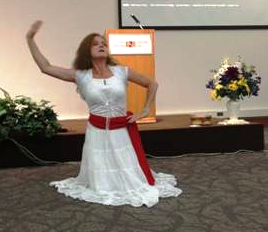Dear Brothers and Sisters in Christ,
 Do you remember the song I Love a Parade? It celebrates our love for celebrations! Our calendars are filled with them—some national, some religious, some just bizarre. Did you know that January 6 is Sherlock Holmes’ birthday, that January 20 is Penguin Awareness day and that April 26 is Hug an Australian day? September has Video Game Day, Preserve the Ozone Day and Elephant Appreciation Day. Marking time with celebrations is as old as civilization itself.
Do you remember the song I Love a Parade? It celebrates our love for celebrations! Our calendars are filled with them—some national, some religious, some just bizarre. Did you know that January 6 is Sherlock Holmes’ birthday, that January 20 is Penguin Awareness day and that April 26 is Hug an Australian day? September has Video Game Day, Preserve the Ozone Day and Elephant Appreciation Day. Marking time with celebrations is as old as civilization itself.
Ancient pagans scheduled celebrations using various calendars. Perhaps the earliest is found in the cave paintings at Lascaux, France where time was marked using the phases of the moon. Ancient monuments in Central and South America and at Stonehenge in England marked time by observing the cycles of the sun and moon.
When God brought Israel out of Egyptian captivity and settled them in the Promised Land, he gave them a luni-solar calendar with annual festivals to remind them of the great events in which he intervened in their history and of the natural cycle of events that showed he alone was Creator. Since Israel was principally engaged in agriculture and animal husbandry, the festivals centered on the harvests.
Israel’s sacred year with its festivals and holy days was determined by observing the phases of the moon, with Israel’s high priest serving as chief observer and calendar custodian. The exact method for determining new moons, the beginning of the new year and other days is not detailed in Scripture. It was passed down through the priests. Even though the temple in Jerusalem was not designed as an astronomical observatory, as were some pagan temples, it served as the base from where the Levitical priesthood decided, by observation, when new months and years began. Numbers chapters 28 and 29 detail the priest’s responsibility to perform sacrifices on new moons and annual festivals.
The Hebrew calendar was not intended to calibrate time for all people in all locations at all times. It was temporary, even as the tabernacle and temple from where it was issued were temporary. Jesus prophesied that the temple standing in his day would be destroyed. Matthew, Mark and Luke recorded Jesus’ prediction. Earlier, Israel’s prophets foretold the same thing: “Therefore because of you, Zion will be plowed like a field, Jerusalem will become a heap of rubble, the temple hill a mound overgrown with thickets” (Micah 3:12).
When the temple was destroyed by the armies of Rome, the calendar went with it. However, even before that destruction, the rules for deciding calendar dates had become mired in political wrangling between the Sadducees and the Pharisees. Those who rejected Jesus decided the calendar should be determined by calculation rather than by the observation of the high priest. All this may seem rather quaint in our “sophisticated” modern age, when we mark the year by the dates of seasonal sales at the mall!
It is not a sin to celebrate ancient events in Israel’s history, but in doing so—fair warning—you may become enmeshed in a contentious debate concerning how to schedule those celebrations. In any case, such celebrations most definitely are not required of Christians, nor do they have salvific value. Observing days does not make anyone righteous.
While some aspects of Israel’s festivals pointed to Jesus and his coming, their worship calendar was not intended to accommodate the dates for celebrating God’s pivotal intervention to save all humanity from its sins in the atoning ministry of Jesus. The Hebrew calendar is no longer used to mark “holy time,” especially since Jesus now lives in us making all our time holy. On the day of Pentecost, the symbol of God’s presence, the shekinah, bypassed the temple to alight on individuals.
Today, the people of God have a new calendar of events that centers on Jesus’ birth, life, death, resurrection, ascension and promised return. Christians celebrate these events at different times and in different ways. Exactly when these events in the life and ministry of Jesus are celebrated is not what is most important. Calendars come and go, but Jesus and his saving acts remain forever. As Christians, we celebrate these acts and respond in joyful obedience to our Lord’s command to go into the world as salt and light, pointing to Jesus, the Living Water who alone quenches our thirst.
Your brother in Christ’s service,
Joseph Tkach











